
Posts by Ashley:
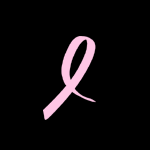
- Fifth Carnival of Feminist Parenting
- Hezky ?esky feministicky – This post of mine translated into Czech
- Recommended Reads from Danine
- prescription drugs without a prescription online href=”http://1dawhy.wordpress.com/2009/07/31/discussion-could-prove-beneficial/”>Understanding Anti-Feminists
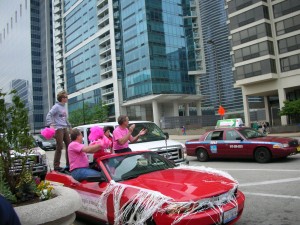
More on Weddings
October 25th, 2009from Jessica Valenti at Feministing was too good not to share with you all. In fact, it had me tearing up a little bit when I got to the end of it, because it is SO TRUE, and I definitely can relate to her, even though I’m not a public figure at all. Being a feminist and deciding to get married opens up a whole can of worms I’m not sure anyone can be ready for. You struggle with identity, generations up on generations of advice and superstition and opinions and as much as you want to just let it roll off your back, you can’t.

Feministing
This post
Here are some of the highlights of the article, but you really should go read the whole thing yourself.
We wanted to make the wedding representative of the institution we’d like marriage to be, and I think we did a good job. Does any of this change the fact that marriage is a historically sexist institution or make it okay that millions of people are denied the right to be married? Of course not. But it made the celebration one that made sense to us, one that re-imagined what marriage as an institution should be about – love, equal partnership and community. (And seriously, to the some of the more conservative relatives at our wedding, hearing these sort of things at a wedding absolutely made an impact.)
And you know what? The wedding really was beautiful. Not because of where it was or because of the flowers (though I did love them!), and not because of the dress. It was beautiful because the thought Andrew and I put into what this day meant to us showed through – it felt like a ceremony and a celebration that represented who we are and who we hope to be together. But most importantly, it was beautiful because the people who matter to us most – our family and our friends – were there to support us and share their love with us. And it’s those people, our community, that I think about today, when I’m feeling so jaded about people’s basic goodness that the idea of writing another word on the internet feels impossible. And to them, I say, truly – thank you.
Comments Off on More on Weddings
Breast Cancer Awareness – 10/25
October 25th, 2009Here’s a link from Vanity Fair about REAL activism. Sure, those Fight Like a Girl t-shirts may have been cool, but they’re no substitute for real activism!
Article courtesy of @jilliancthomas
Support Breast Cancer Awareness here.
See all Breast Cancer Awareness Month posts
Comments Off on Breast Cancer Awareness – 10/25
Breast Cancer Awareness – 10/24
October 24th, 2009Loving these t-shirts! Fight like a girl!
Support Breast Cancer Awareness here.
See all Breast Cancer Awareness Month posts
Breast Cancer Awareness – 10/23
October 23rd, 2009Today’s link is from Jezebel: Breast Cancer is a Disease, Not a Marketing Opportunity
Support Breast Cancer Awareness here.
See all Breast Cancer Awareness Month posts
Breast Cancer Awareness – 10/22
October 22nd, 2009Today’s awesome picture is from Lolcats, via Criss L. Cox.
Support Breast Cancer Awareness here.
Comments Off on Breast Cancer Awareness – 10/22
What Feminism Means To Me: Criss L. Cox
October 21st, 2009
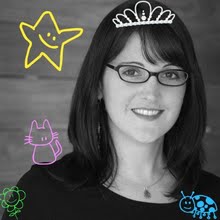
Criss L. Cox
Today’s post comes from Criss L. Cox, and is part of a Salon of blog posts asking feminists to define what feminism means to them. You can follow Criss on Twitter and read her blog.
I used to think “feminists” were angry man-haters who burned bras and didn’t shave their armpits. I didn’t want to be one of them — I liked men! I wanted to marry one someday. I wanted a big wedding, with a pretty white dress, and I wanted to have kids, and I wanted to stay home with my kids. Feminists hated women who wanted to quit their jobs to stay home and raise their kids, right?
Um, WRONG. Sure, there are radical extremists in every group (my sister, a SAHM (stay at home mom) and a feminist, was called out on her blog a while back by an angry commenter who accused her of setting the women’s movement back several decades, because my sister stayed home to raise her son), but those extreme outliers are not a true representation of the group or movement.
I would like to stay home with my kids, when I have them, because I like kids. I’ve spent my adult life working with children, from toddlers and infants in daycare centers to high schoolers in my teaching jobs to elementary kids in Sunday school classes at church. Kids are my thing, so when I have some of my own I want to spend as much time with them as possible.
I also have a Bachelor’s degree and I’m four credit hours away from a Master’s; I have ample experience in the workplace, and I know I can support myself (and those potential future children) if need be. If my husband and I can afford the luxury of my staying home with our potential future kids, I will still continue blogging, writing, and if in any way possible I’ll sneak in classes toward my PhD. I, like my sister, am far from your stereotypical 50’s housewife stay-at-home mom.
Feminism isn’t about telling women (or anyone) what to do; it’s about giving women, and anyone else, the right to choose for themselves what they want to do. Our job is to make sure every option is open to everyone.
Feminism isn’t limited to females, either. It’s not about ending oppression for women (which, oftentimes unfortunately is shorthand for “white, heterosexual, cis, able-bodied women”), but about ending oppression for all marginalized groups. After all, women are half of the world’s population, and in that group, you will find all sorts of women. When we fight for “women” we must fight for ALL these women.
Feminism isn’t even just about women (all women). While gender roles have traditionally put women in a more submissive role and held us back, men are also harmed and limited by gender roles. In a way, we women have the advantage over men in this area: Women can pop open a beer and watch the football game, but a guy is going to get funny looks if he enjoys a nice glass of white zinfandel and goes to see the ballet (unless he has a girl with him, and she’s, like, “making him”). Feminists work to change gender roles so both men and women are free to make whichever choices their little hearts desire without having to censor or deny themselves because of society’s small-minded expectations.
Feminist movement has moved beyond the work-or-stay-home-with-kids issue. While we must continue the work that has been done on that front (to ensure women are treated equally in the workplace and that girls have access to education so they can compete on a more even field with men in the workplace), we have so many other issues to tend to as well.
Unfortunately, one of those issues is getting others to understand what we are actually about. First of all, it’s not about YOU, it’s about ME. When I fight for women’s rights, reproductive rights, LGBT rights, etc., I’m not telling you what YOU need to do or how YOU need to live your life. I’m telling you how I want to live my life; all you have to do is LET ME. Stop passing laws that stop me or limit me or oppress me. Your right to work full-time and be a CEO of whatever company does not in any way interfere with my right to choose a career in education, a typically female-dominated (and underpaid) field, nor does it interfere with my sister’s right to stay at home with her child. My choice does not diminish yours any more than yours diminishes mine.
Another pressing item on the agenda is to dispel the myth of the scary, hairy-armpitted feminazi. Women — and man — need to be proud to call themselves feminists. It is not a dirty word! Embracing feminism is merely embracing the idea that none of us — male, female, gay, bi, hetero, cis, trans, abled, disabled, thin, fat, and everything around and in-between — deserve to be treated with respect. You know, unlike a doormat.
To read all of the What Feminism Means To Me Salon posts, click here.
Breast Cancer Awareness – 10/21
October 21st, 2009A great picture: Rosie the Riveter and Breast Cancer Awareness! A great feminist cause.
Support Breast Cancer Awareness here.
See all Breast Cancer Awareness Month posts
Comments Off on Breast Cancer Awareness – 10/21
Breast Cancer Awareness – 10/20
October 20th, 2009The American Cancer Society’s take on Breast Cancer Awareness Month
Support Breast Cancer Awareness here.
See all Breast Cancer Awareness Month posts
Comments Off on Breast Cancer Awareness – 10/20
What Feminism Means To Me: Kate Rohdenburg
October 19th, 2009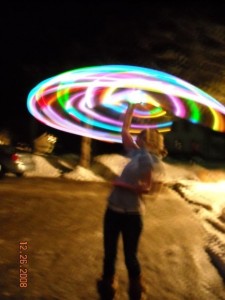
Kate Rohdenburg
Today’s post comes from Kate Rohdenburg, and is part of a Salon of blog posts asking feminists to define what feminism means to them. You can follow Kate on Twitter, read her blog, and check out her answers to the Literacy in the Feminist Blogging Community interview.
I think in large part feminism to me is summed up in the quote I use for my signature: —
“I’m an artist and a community organizer, and I believe in peace and love, and I believe we need to keep putting our stuff out there; it puts out the intention for a bigger reality.”
-Shannya Sollitt
Feminism is these things – art and activism, peace and love, and imagining a reality that could be while working in the context of the one that is.
Feminism is about choices, not in the sense that many modern-feminists use the term “I’m a woman/feminist therefore any choice I make is feminist”, but in the sense that we are about creating a space where choices are available and safe (even choice that may not be utterly feminist.) Feminism created choices (especially for women and minorities), but not all choices are feminist ones.
Feminism is not about including everyone, but it is about appreciating everyone; recognizing the humanity in everyone, and interacting with everyone in a way based in love and understanding – not fear and hate. An example for me is this: I do not believe that one can be feminist and anti-choice. Anti-choice is an inherently anti-woman system of beliefs that are in direct contrast to feminism. However, I don’t wish to argue or yell or hate people who are anti-choice, but to speak with them in contexts where there may be increased understanding, and disengage when there can be nothing but anger.
Feminism is a theory – one which has principles, principles which certainly not everyone adheres to, and therefore it is faulty to say that anyone is feminist. Indeed people must believe in the theory, and work towards the practice, in order to truly be feminist. There is not one way, nor one perfect representation of this, but there are some qualifications.
To read all of the What Feminism Means To Me Salon posts, click here.
Breast Cancer Awareness – 10/19
October 19th, 2009
Pink Ribbon
Another website you should check out: breastcancerawareness.com
Support Breast Cancer Awareness here.
See all Breast Cancer Awareness Month posts
Comments Off on Breast Cancer Awareness – 10/19
Literacy in the Feminist Blogging Community: Annotated Bibliography – Draft 2
October 18th, 2009Once again, I’m sharing my research for my Literacy in the Feminist Blogging Community thesis project with you! (You can see the previous draft here.) These are some really great sources for anyone interest in feminism, blogging, or literacy – or, if you’re like me, all three!
Again, I would love some feedback about these sources – Are they scholarly enough? Do you have anything else I should add to my list? Is there anything on here you’ve read before? Is there anything on here you’re really interested in reading? Any feedback helps, especially because I have to submit the final draft of this in a week! 🙂
Annotated Bibliography
Androutsopoulos, Jannis. “Potentials and Limitations of Discourse-Centred Online Ethnography.” Language@Internet, 5 (2008), article 9. 7 July 2009 <http://www.languageatinternet.de>.
Completing an ethnography about several writers’ literacy practices online and deciphering how these writers create a community online will be a difficult task; each blogger’s style can be so different and it takes a community of people to spread the word about blogs in order to get the kind of readership needed for real change. Also, the nature of the Internet is such that there is no one “site” to observe. Therefore, I have decided that this study of feminist bloggers must be a combination of a participant-observation research of a field site and ethnographic interviews in order to complete a discourse centered online ethnography. According to this article by Jannis Androutsopoulos, an online ethnography “combines the systematic observation of selected sites of online discourse with direct contact with its social actors” (2). I will be using several feminist blogs as sites and evidence of texts, and I will also conduct several interviews with the bloggers themselves to collect their ideas of literacy and how this burgeoning technology effects how they read, write, discuss, and share information. I will use Androutsopoulos’ definition and outline of an online ethnography to form my methodology for this project.
Aronson, Pamela. “Feminists or ‘Postfeminists’?: Young Women’s Attitudes toward Feminism and Gender.” Gender and Society 17.6 2003. 903-922. Web. 7 Oct 2009. JSTOR. Retrieved at Elmhurst College Library. <http://www.jstor.org/stable/3594676>.
Baumgardner, Jennifer, and Amy Richards. ManifestA: Young Women, Feminism, and the Future. New York: Farrar, Straus, and Giroux, 2000.
Berryman-Fink, Cynthia, Et al. “Blogging About Feminist Interdisciplinarity in the Study of Communication, Language, and Gender.” Women & Language 31.2 (Fall 2008): 26-35. Academic Search Complete. EBSCO. Elmhurst College Library, Elmhurst, IL. 30 Sep 2009 < http://search.ebscohost.com/>.
Bix, Amy Sue. “History of Women in Science and Technology.” Transforming the Disciplines: Women’s Studies Primer. Ed. Elizabeth L. McNabb, et al. New York: The Haworth Press, 2001. 193-201.
Boylan, Anne M. The Origins of Women’s Activism. Chapel Hill: The University of North Carolina Press, 2002.
Buschman, Joan K, and Silvo Lenart. “‘I Am Not a Feminist, but…’: College Women, Feminism, and Negative Experiences.” Political Psychology 17.1 1996. 59-75. Web. 7 Oct 2009. JSTOR. Retrieved at Elmhurst College Library. <http://www.jstor.org/stable/3791943>.
DeVoss, Danielle N., and Cynthia L. Selfe. “”This Page is under Construction”: Reading Women Shaping On-line Identities.” Pedagogy: Critical Approaches to Teaching Literature, Language, Composition, and Culture 2002: 31-48. MLA International Biography. Elmhurst College Library. Web.24 July 2009. <http://wf2dnvr17.webfeat.org:80/>.
Friedman, Jaclyn. “Blogging While Female: Cyberintimidation crosses a line.” Bitch Magazine: Feminist Response to Pop Culture (Summer 2007): 17-17. Academic Search Complete. EBSCO. Elmhurst College Library, Elmhurst, IL. 30 Sep 2009 < http://search.ebscohost.com/>.
This article originally appeared in Bitch Magazine, which has a primarily female audience. Friedman writes about Kathy Sierra, a techie and blogger who has entered into the primarily male world of technology with some terrible consequences. Just because she was female, she received several threats online, and Friedman details how she fought back against these threats. Friedman also brings up the point that women are not typically accepted in the blogging and technology world. This article, although not scholarly in its tone, will be very helpful to me in defining an online feminist community and the challenges women face when trying to make their blogs successful. Also, on my questionnaire that I will be using to interview the bloggers, I will be asking them about a time they were misunderstood on their blog. This article will help me think about what it means to be misunderstood, and will provide a frame of reference when talking about why the bloggers I’m interviewing received some of the comments they have.
hooks, bell. “Feminism: A Movement to End Sexist Oppression.” Feminist Theory From Margin to Center. Cambridge: South End Press, 2000. 18-33.
bell hooks is one of the foremost feminist theorists of our time, and, as such, I anticipate much of her writing will be useful to me in this paper – particularly in the section of my paper in which I define feminism. hooks begins this particular essay by discussing the problems with feminist discourse: “A central problem within feminist discourse has been our inability to either arrive at a consensus of opinion about what feminism is or accept definition(s) that could serve as points of unification. Without agreed-upon definition(s), we lack a sound foundation on which to construct theory or engage in overall meaningful praxis” (18). This is precisely the problem feminist bloggers deal with on a daily basis. Every writer has a different definition of feminism, and this can cause discrepancies and arguments within the feminist community – a community that needs solidarity to survive. I hope to use hooks’ theories of feminism to illuminate the problems that arise in building an online feminist community, as well as to help tackle the ever-present problem of defining feminism in modern culture.
–. “The Significance of Feminist Movement.” Feminist Theory From Margin to Center. Cambridge: South End Press, 2000. 34-42.
–. “Sisterhood: Political Solidarity Among Women.” Feminist Theory From Margin to Center. Cambridge: South End Press, 2000. 43-67.
Kirsch, Gesa E. “Friendship, Friendliness, and Feminist Fieldwork.” Signs: Journal of Women in Culture and Society Summer 2005: 2163-2172. MLA International Biography. Elmhurst College Library. Web.23 Jul 2009. < http://wf2dnvr17.webfeat.org:80/4nxUM1538/url=http://content.ebscohost.com/pdf10/pdf/2005/SIG/01Jun05/17328695.pdf?T=P&P=AN&K=17328695&S=R&D=sih&EbscoContent=dGJyMNHr7ESeqLQ4yOvqOLCmrlGep7JSr6i4SbGWxWXS&ContentCustomer=dGJyMPGutlC1prBNuePfgeyx44Hy7fEA>.
Throughout this project, I must keep in mind that I am not only an observer of this community, but I am also a participant of it. In this article, Gesa Kirsch illuminates possible problems with friendships and how they interact with fieldwork and posits the following advice: “Unlike friendships, which develop over time and are built on reciprocal trust and shared information and activities, interviews are likely to be asymmetrical interactions, with one party—the party generally with the most institutional power—asking the questions and the other answering. While feminists have worked hard to make these interactions mutually beneficial, to encourage the exchange of information, and even to propose the possibility of a friendship between researcher and participant, such relationships are still based in large part on an interview process whereby the flow of information is one-sided” (2165). Feminism work to undo patriarchy and power relations on every level, and the power relationship between interviewer and interviewee is no different. In order to conduct an interview that is mutually beneficial and does not play in to a hierarchical power structure, I must keep the interviews open to dialogue and input. Luckily, I already know some of the perspective participants from my undergraduate studies, and all of them are people with whom I have shaped an online relationship already, which will help me conduct these interviews. Although it will be beneficial, my previous involvement in this community could also cause bias in my research, as well as in the gathering of data, which is also something of which I must be aware.
Levy, Steven. “Blogging Beyond the Men’s Club.” Newsweek 145.12 (12 Mar. 2005): 16-16. Academic Search Complete. EBSCO. Elmhurst College Library, Elmhurst, IL. 30 Sep 2009 < http://search.ebscohost.com/>.
This Newsweek article appeared in 2005 after a Harvard conference on bloggers and the media. In it Levy questions, and rightfully so, the lack of diversity in the blogosphere. He questions that the smartest and best bloggers will rise to the top, since all of the bloggers at the top seemed to be white and male. He posits that this is because blogs are judged by how many people link to them, and as it appeared after that conference, white male bloggers were linking to other white male bloggers. He also provides a few suggestions as to how to promote diversity online. This article will be extremely helpful in my discussion about female bloggers and the challenges they face while trying to break into the blogosphere. Also, I plan on using a section of my project to discuss the diversity of my interview participants, and this article will go a long way toward helping me talk about why there are so few women at the top.
Lindquist, Julie and David Seitz. The Elements of Literacy. New York: Longman, 2009.
As a textbook, this was very informative and user-friendly in my Seminar in Literacy class this summer. I use several passages out of this book to compose my theoretical framework and my method for analysis of my interviews about the literacy events of feminist bloggers. The chapters in this book include an introduction to literacy, discussions about literacy and the mind, literacy and culture, literacy and class, literacy and work, and literacy and technology. These chapters all look at different literacy theorists and use the theories to analyze literacy events from every day life. I hope to emulate some of this analysis in my own project. I anticipate the chapters about technology, culture, and mind will be particularly helpful to me as I discuss blogging, feminism, and the individual literacy practices of the bloggers participating in my interview.
Miller, Carolyn R. and Dawn Shepherd. “Blogging as Social Action: A Genre Analysis of the Weblog.” The Norton Book of Composition. Susan Miller, ed. New York: W.W. Norton & Company, 2009. 1450-1473.
This is a scholarly article written primarily for those interested in the history of blogging as a genre. In this article, Miller and Shepherd set out analyzing blogs in order to discover many things about blogs, including why blogging caught on so quickly, what the motivations behind bloggers are, what rhetorical work blogs perform and how they perform this work, and how to define blogs as a genre. In order to answer these questions, Miller and Shepherd analyzed a random selection of personal blogs, well-known blogs, and evaluative criteria within blogging communities. Miller and Shepherd do a good job of looking at the history of blogs, as well as the history surrounding their emergence. However, this article is a bit outdated. They seem to be looking only at personal and famous blogs, not at activist blogs like the ones I will be analyzing. They also do not work with bloggers as authors of this genre, but rather focus just on the blogs themselves. The article is helpful to me, however, in looking at the emergence of blogs and their history, and is very helpful to me in defining blogs as a genre.
Miller, Hildy. “The Impact of Women’s Studies on Rhetoric and Composition.” Transforming the Disciplines: Women’s Studies Primer. Ed. Elizabeth L. McNabb, et al. New York: The Haworth Press, 2001. 17-22.
The book, Transforming the Disciplines: Women’s Studies Primer, is composed of chapters which are separate essays; each essay tackles how women’s studies or women’s perspectives have changed each subject area. This particular essay, “The Impact of Women’s Studies on Rhetoric and Composition,” first briefly explores the history of composition, beginning with Aristotle and Plato. Then, Miller moves into talking about women’s perspective on writing. She discusses the difference between men’s and women’s processes of writing, how men and women respond to rhetorical situations differently, and what it means to compose as a woman. She also discusses ways in which women experience writing differently. For example, she says many women experience writer’s block differently than men because of their long history of being silenced (21-22). This essay will be very helpful to me because so much of my research deals with how feminist bloggers – mostly women, but also men who write about women’s issues – compose articles and posts, deal with rhetorical situations, and experience literacy events. This article will help me set out a theoretical framework or, at the very least, a hypothesis regarding how women writers go about their writing.
Morgan-Curtis, Samantha A. “Blogging as a Capstone and Continuing Project. Feminist Collections: A Quarterly of Women’s Studies Resources 27.2/3 (Winter/Spring 2006): 19-20. Academic Search Complete. EBSCO. Elmhurst College Library, Elmhurst, IL. 30 Sep 2009 < http://search.ebscohost.com/>.
Newman, M.E.J. “Modularity and Community Structure in Networks.” Proceedings of the National Academy of Sciences of the United States of America 103.23 2006. 8577-8582. JSTOR. Web. 07 Oct 2009. <http://www.jstor.org/stable/30050231>.
Rhoades, Georgia. “Listening to Women’s Voices and Reading Women’s Words: How Women’s Studies Has Helped to Transform the Teaching of Literature.” Transforming the Disciplines: Women’s Studies Primer. Ed. Elizabeth L. McNabb, et al. New York: The Haworth Press, 2001. 55-62.
Rhodes, Jacqueline. “‘Substantive and Feminist Girlie Action’: Women Online.” College Composition and Communication Sep 2002: 116-142. JSTOR. Elmhurst College Library. Web.23 Jul 2009. <http://www.jstor.org/stable/1512105>.
This article by Jacqueline Rhodes will be very helpful to me in many ways. It will be minimally helpful to me to define feminism and feminist activism, which is becoming a very large part of my paper and a very daunting task. However, this article has provided some extremely helpful insight to feminist texts of the past – particularly the 60’s and 70’s – and how those texts are similar to feminist texts which exist online today. For quite some time, feminists have used the power and ease of distribution of the written word to spread their ideas to a wider audience. They wrote radical texts in the form of manifestos, guides, statements of purpose, and other political texts that were often linked together – or referential to each other in some way – and were distributed quickly and publicly and often disappeared as rapidly as they appeared. Rhodes writes that “[r]adical feminists in the late 1960s and early 1970s poured out ‘temporary’ texts… that were often written collaboratively, distributed collectively and publicly through the magic of mimeography and volunteer effort…” (116-117). These texts, she goes on to say, parallel today’s cyber-culture in many ways, “not the least of which is the feminist sense of textuality that arises sometimes out of, sometimes in response to, and sometimes in direct contradiction to larger political moments” (117-118) as well as the emphasis on networking texts which creates the possibility for a community of writers calling people into action. This information – as well as her bibliography – will be extremely helpful as I work to prove that blogging is a form of activism, especially where feminists are concerned.
Rosser, Sue V. “Through the Lenses of Feminist Theory: Focus on Women and Information Technology.” Frontiers 26.1 2005. 1-23. Web. 30 Sep 2009. Project Muse. Retrieved at Elmhurst College Library.
Szwed, John F. “The Ethnography of Literacy.” Literacy A Critical Sourcebook. Ed. Ellen Cushman, et al. Boston: Bedford/St. Martin’s, 2001. 421-429.
I plan on using this article by Szwed to shape the theoretical framework I will be using to analyze the interviews I conduct with feminist bloggers. Szwed uses five categories – text, or what is being written; context, or under what circumstances the reading and writing is being done; function, or what purposes and uses the reading and writing served; participants, or who is involved in their reading and writing process; and motivation, or what tensions, desires, or needs motivate the writers and readers – to analyze literacy events. By breaking up the information presented to me through interviews with bloggers into these five categories, I can analyze the information and look for patterns and discrepancies between the bloggers’ processes of reading and writing online. This, in turn, will help me come to conclusions about how communities are formed online through literacy events.
Thornham, Sue. Women, Feminism, and Media. Edinburgh: Edinburgh University Press, 2007.
Watt, Jenn. “Blogging Busts Out for Women.” Herizons 20.1 (Summer 2006): 7-7. Academic Search Complete. EBSCO. Elmhurst College Library, Elmhurst, IL. 30 Sep 2009 < http://search.ebscohost.com/>.
Breast Cancer Awareness – 10/18
October 18th, 2009Yet another great resource: Susan G. Komen
Support Breast Cancer Awareness here.
See all Breast Cancer Awareness Month posts
Comments Off on Breast Cancer Awareness – 10/18
Breast Cancer Awareness – 10/17
October 17th, 2009Another great resource: The Avon Foundation
Support Breast Cancer Awareness here.
See all Breast Cancer Awareness Month posts
Comments Off on Breast Cancer Awareness – 10/17
Breast Cancer Awareness – 10/16
October 16th, 2009
Pink Ribbon
A great resources: The National Breast Cancer Foundation
Support Breast Cancer Awareness here.
See all Breast Cancer Awareness Month posts
Comments Off on Breast Cancer Awareness – 10/16
Breast Cancer Awareness – 10/15
October 15th, 2009
Pink Ribbon
Feminist Majority Foundation’s Choices Campus Blog had a great post about Breast Cancer Awareness this past week, so go check it out!
Support Breast Cancer Awareness here.
See all Breast Cancer Awareness Month posts
Comments Off on Breast Cancer Awareness – 10/15
Small Strokes on the Road
October 14th, 2009I’m being linked all over the place! Thanks to those showing love for Small Strokes. All these little things – these small strokes – can really add up, and it makes me happy that people are noticing! Check out these links (where I am linked!):
These are some really great sites! Check them out!
Breast Cancer Awareness – 10/14
October 14th, 2009This may be the last picture of the month, unless you want to see more!
These guys blasted music from their red convertible and danced around on it! It was great!
Support Breast Cancer Awareness here.
See all Breast Cancer Awareness Month posts
Comments Off on Breast Cancer Awareness – 10/14
Breast Cancer Awareness – 10/13
October 13th, 2009I’m loving looking at these pictures again! Are you loving seeing them for the first time?
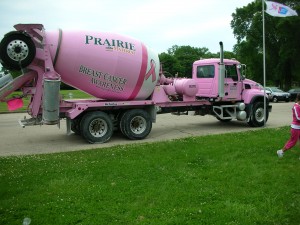
Pink Cement Truck
An awesome cement truck, decked out for the cause!
Support Breast Cancer Awareness here.
See all Breast Cancer Awareness Month posts
Comments Off on Breast Cancer Awareness – 10/13
Breast Cancer Awareness – 10/12
October 12th, 2009Walking past the Field Museum:
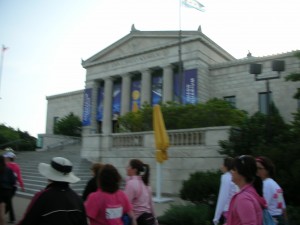
Field Museum 2009
Early detection saves lives! Support Breast Cancer Awareness here.
See all Breast Cancer Awareness Month posts
Comments Off on Breast Cancer Awareness – 10/12
Breast Cancer Awareness – 10/11
October 11th, 2009Enjoying these pictures? Here’s another!
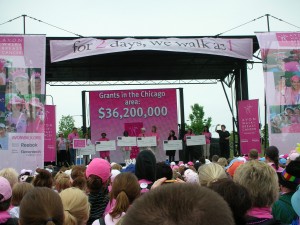
Closing Breast Cancer Awareness here.
Support
See all Breast Cancer Awareness Month posts
Comments Off on Breast Cancer Awareness – 10/11

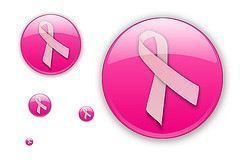
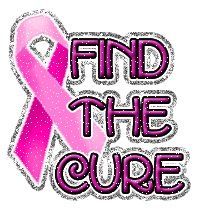
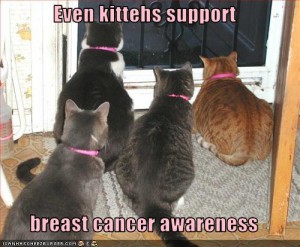
![Reblog this post [with Zemanta]](http://img.zemanta.com/reblog_e.png?x-id=540213e6-9c6a-4dc2-b118-4857c32f13ba)

![Reblog this post [with Zemanta]](http://img.zemanta.com/reblog_e.png?x-id=e3dfdc16-630f-4f91-9b8c-a65f79e1db62)

![Reblog this post [with Zemanta]](http://img.zemanta.com/reblog_e.png?x-id=4d29f698-e003-4028-92b2-93ec3bfc8420)